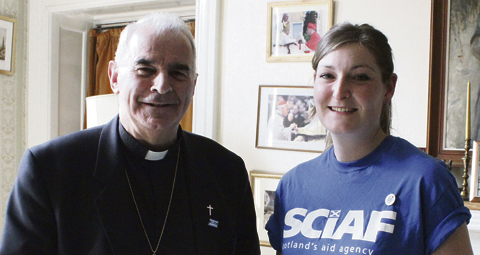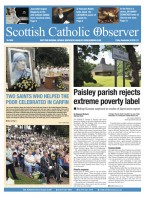BY Martin Dunlop | May 4 2012 | ![]() 1 COMMENT
1 COMMENT ![]() print
print

Cardinal O’Brien challenges PM on ‘immoral’ poverty
Publication Date: 2012-05-04
Cardinal Keith O’Brien has accused Prime Minister David Cameron of ‘immoral’ actions by favouring the rich ahead of those worst affected by the recession.
Britain’s most senior Catholic clergyman has branded the UK Government’s opposition to a ‘tiny tax’ on banks and the financial sector to help combat poverty as ‘shameful’ and reiterated his support for the introduction of a Robin Hood Tax on institutions in the UK.
Strong criticism
The cardinal urged Mr Cameron not just to help ‘your very rich colleagues’ and said it was immoral ‘just to ignore’ those who were suffering as a result of recent financial disasters.
“My message to David Cameron, as the head of our government, is to seriously think again about this Robin Hood Tax, the tax to help the poor by taking a little bit from the rich,” Cardinal O’Brien said. “The poor have suffered tremendously from the financial disasters of recent years and nothing, really, has been done by the very rich people to help them.
“And I am saying to the Prime Minister, look, don’t just protect your very rich colleagues in the financial industry, consider the moral obligation to help the poor of our country.”
Robin Hood Tax
The cardinal highlights in his letter to Mr Cameron that introducing a ‘financial transactions tax of just 0.05 per cent on high end products’ such as derivatives and hedge fund trades, could raise up to £20 billion in additional income in the UK alone.
“Much of this could support domestic social priorities but at least 50 per cent could be spent on tackling global poverty and climate change,” the cardinal writes in the letter.
“From the perspective of the Church, and in the eyes of the public I’m sure, it is not acceptable for your Government to protect the very wealthiest people in our country at the expense of the poor, as appears the case with your current opposition to the Robin Hood Tax.”
The cardinal’s call for the introduction of a Robin Hood Tax, outlined in a letter to the Prime Minister, has been backed by Scotland’s First Minister Alex Salmond.
SCIAF support
The cardinal has also highlighted that thousands of supporters of the Catholic aid agency SCIAF have signed up to the campaign to introduce a Robin Hood Tax, adding their voices to a widespread movement across Scotland, the UK and internationally.
Lexi Barnett (above), SCIAF’s campaigns officer, commented that Cardinal O’Brien is ‘joining a growing movement of high-profile figures’ calling for the tax to be introduced.
The UK Government has opposed the unilateral introduction of the Robin Hood Tax arguing that jobs and investment would be lost overseas.
As the SCO went to press, no response had been made to the cardinal’s letter by the Prime Minister’s office.












Out of the millions of investors and savers, few are rich. Most of us are poor to middle class. We feel that it is our responsibility and duty to save what little we can and it’s already nearly impossible with taxes and inflation taking most of our life savings.
Now another tax? This ironically named Robin Hood Tax steals from the poor and middle class by taxing the entire investment infrastructure that we use and will have to pay for. We are already overwhelmed with corporation tax, dividend tax, stamp duty, and personal tax.
The system highly favours the creation of debt entrapment over investing freedom. It has permitted the build-up of ludicrous amounts of debt and leverage while punishing those that save and invest with taxes. In return, we receive artificially low interest yields that only encourage more debt.
The system incentivises, lures and traps the poor in an inescapable burden of debt with an increasing number of incentives for more debt and bailouts for banks to continue the same destructive cycle.
We want to see the proper behavior of investing-saving encouraged by decreasing the investment tax burden. We want to see the reckless behavior of encouraging and incentivising debt reversed. We want the Debt Default Insurance Tax that will discourage the same behavior that singly created the financial crisis. This will encourage the debtor-lender to be responsible for their own actions and prevent scapegoating of investors when their debt-ridden house of cards collapses. This will pay for the damage done, prevent more financial crises, tackle global poverty and reverse climate change.